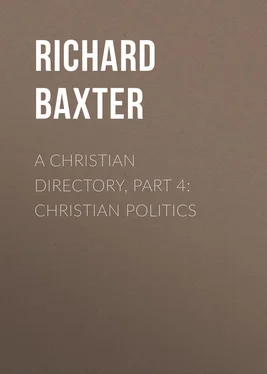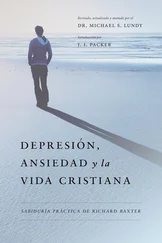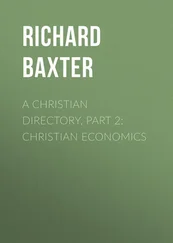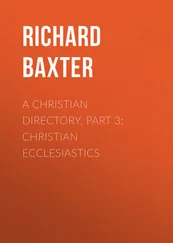Richard Baxter - A Christian Directory, Part 4 - Christian Politics
Здесь есть возможность читать онлайн «Richard Baxter - A Christian Directory, Part 4 - Christian Politics» — ознакомительный отрывок электронной книги совершенно бесплатно, а после прочтения отрывка купить полную версию. В некоторых случаях можно слушать аудио, скачать через торрент в формате fb2 и присутствует краткое содержание. Жанр: foreign_antique, foreign_prose, на английском языке. Описание произведения, (предисловие) а так же отзывы посетителей доступны на портале библиотеки ЛибКат.
- Название:A Christian Directory, Part 4: Christian Politics
- Автор:
- Жанр:
- Год:неизвестен
- ISBN:нет данных
- Рейтинг книги:3 / 5. Голосов: 1
-
Избранное:Добавить в избранное
- Отзывы:
-
Ваша оценка:
- 60
- 1
- 2
- 3
- 4
- 5
A Christian Directory, Part 4: Christian Politics: краткое содержание, описание и аннотация
Предлагаем к чтению аннотацию, описание, краткое содержание или предисловие (зависит от того, что написал сам автор книги «A Christian Directory, Part 4: Christian Politics»). Если вы не нашли необходимую информацию о книге — напишите в комментариях, мы постараемся отыскать её.
A Christian Directory, Part 4: Christian Politics — читать онлайн ознакомительный отрывок
Ниже представлен текст книги, разбитый по страницам. Система сохранения места последней прочитанной страницы, позволяет с удобством читать онлайн бесплатно книгу «A Christian Directory, Part 4: Christian Politics», без необходимости каждый раз заново искать на чём Вы остановились. Поставьте закладку, и сможете в любой момент перейти на страницу, на которой закончили чтение.
Интервал:
Закладка:
Quest. III. Am I bound to forgive another, if he ask me not forgiveness? The reason of the question is, because Christ saith, Luke xvii. 3, 4, "If thy brother trespass against thee, rebuke him: and if he repent, forgive him; and if he trespass against thee seven times in a day, and seven times in a day turn again to thee, saying, I repent, thou shalt forgive him."
Answ. In the resolving of this, while some have barely affirmed, and others denied, for want of distinguishing, they have said worse than nothing. It is necessary that we distinguish,
1. Between the forgiving of an enemy, and of a stranger, and of a neighbour, and of a brother, as such.
2. Between the several penalties to be remitted (as well as revenges to be forborne). And so briefly the case must be thus resolved.
Prop. I. An enemy, a stranger, and a neighbour, as such, must be forgiven (in the cases before asserted) though they ask not forgiveness, nor say, I repent: for,
1. Many other scriptures absolutely require it.
2. And forgiving them as such, is but the continuing them in our common charity, as men, or neighbours; that is, our not endeavouring to ruin them, or do them any hurt, and our hearty desiring and endeavouring their good, according to their capacities or ours; and thus far we must forgive them.
Prop. II. A brother also must be thus far forgiven, though he say not, I repent; that is, we must love him as a man, and wish and endeavour his good to our power.
Prop. III. A brother as a brother, is not to be so forgiven, as to be restored to our estimation and affection, and usage of him as a brother, either in spiritual account, or intimate special love and familiarity, as long as he is impenitent in his gross offences; and that is, till he turn again and say, I repent. A natural brother is still to be loved as a natural brother. For that kind of love dependeth not on his honesty or repentance. But,
1. A brother in a religious sense,
2. Or a bosom, familiar friend, are both unfit for to be received in these capacities, till they are penitent for gross offences; therefore the church is not to pardon the impenitent, in point of communion, nor particular christians to pardon them in their esteem and carriage; nor am I bound to take an unfit person to be my bosom friend to know my secrets: therefore if either of these offend, I must not forgive them, that is, by forgiveness continue them in the respect and usage of this brotherhood, till they repent; and this (first especially) is the brother mentioned in the text.
Quest. IV. Is it lawful to sue a brother at law? The reason of the question is, from the words of the apostle Paul, 1 Cor. vi. 7, "There is utterly a fault among you, because ye go to law one with another. Why do ye not rather take wrong? why do ye not rather suffer yourselves to be defrauded?"
Answ. 1. Distinguish betwixt going to law before heathens, or other enemies to the christian religion, and before christian magistrates.
2. Between going to law in malice for revenge, and going merely to seek my right, or to seek the suppression and reformation of sin.
3. Between going to law when you are bound to forgive, and when you are not.
4. And between going to law in haste and needlessly, and going to law as the last remedy, in case of necessity, when other means fail.
5. And between going to law when the hurt is like to be greater than the benefit, and going to law when it is likely to do good. There is a great deal of difference between these cases.
Prop. I. Christians must rather suffer wrong, than go to law before the enemies of religion, when it is like to harden them, and to bring christianity into contempt.
Prop. II. It is not lawful to make law and justice the means of private unlawful revenge; nor to vent our malice, nor to oppress the innocent.
Prop. III. Whenever I am bound to forgive the trespass, wrong, or debt, then it is unlawful to seek my own at law. For that is not forgiving.
Prop. IV. There are many other remedies which must first be tried (ordinarily) before we go to law. As,
1. To rebuke our neighbour for his wrong, and privately to desire necessary reparations.
2. To take two or three to admonish him; or to refer the matter to arbitrators (or in some cases to a lot). And if any make law their first remedy needlessly, while the other means should first be used, it is a sin.
Prop. V. It is not lawful to go to law-suits, when prudence may discern that the hurt which may come by it, will be greater than the benefit; (either by hardening the person, or disturbing ourselves, or scandalizing others against religion, or drawing any to ways of unpeaceableness and revenge, &c.) The foreseen consequences may overrule the case.
But on the other side, Prop. I. It is lawful to make use of christian judicatories, so it be done in a lawful manner; yea, and in some cases, of the judicatories of infidels.
Prop. II. The suppressing of sin, and the defending of the innocent, and righting of the wronged, being the duty of governors, it is lawful to seek these benefits at their hands.
Prop. III. In cases where I am not obliged to forgive, (as I have showed before some such there be,) I may justly make use of governors as the ordinance of God.
Prop. IV. The order and season is when I have tried other means in vain; when persuasion or arbitration will do no good, or cannot be used with hope of success.
Prop. V. And the great condition to prove it lawful is, when it is not like to do more hurt than good, either directly of itself, or by men's abuse; when religion, or the soul of any man, or any one's body, or estate, or name, is not like to lose more than my gain, or any other benefits, will compensate; when all these concur, it is lawful to go to law.
Quest. V. Is it lawful to defend my person, life, or estate against a thief, or murderer, or unjust invader, by force of arms?
Answ. You must distinguish, 1. Between such defence as the law of the land alloweth, and such as it forbiddeth.
2. Between necessary and unnecessary actions of defence.
Prop. I. There is no doubt but it is both lawful and a duty to defend ourselves by such convenient means as are likely to attain their end, and are not contrary to any law, of God or man. We must defend our neighbour if he be assaulted or oppressed, and we must love our neighbour as ourselves.
Prop. II. This self-defence by force, is then lawful, when it is necessary, and other more gentle means have been uneffectual, or have no place (supposing still that the means be such as the law of God or man forbiddeth not).
Prop. III. And it is necessary to the lawfulness of it, that the means be such as in its nature is like to be successful, or like to do more good than harm.
But on the other side, Prop. I. We may not defend ourselves by any such force as either the laws of God or our rulers, thereto authorized by him, shall forbid. For,
1. The laws are made by such as have more power over our lives, than we have over them ourselves.
2. And they are made for the good of the commonwealth; which is to be preferred before the good or life of any single person. And whatever selfish infidels say, both nature and grace do teach us to lay down our lives, for the welfare of the church or state, and to prefer a multitude before ourselves. Therefore it is better to be robbed, oppressed, or killed, than to break the peace of the commonwealth.
Prop. II. Therefore a private man may not raise an army to defend his life against his prince, or lawful governor. Perhaps he might hold his hands if personally he went about to murder him, without the violation of the public peace; but he cannot raise a war without it.
Читать дальшеИнтервал:
Закладка:
Похожие книги на «A Christian Directory, Part 4: Christian Politics»
Представляем Вашему вниманию похожие книги на «A Christian Directory, Part 4: Christian Politics» списком для выбора. Мы отобрали схожую по названию и смыслу литературу в надежде предоставить читателям больше вариантов отыскать новые, интересные, ещё непрочитанные произведения.
Обсуждение, отзывы о книге «A Christian Directory, Part 4: Christian Politics» и просто собственные мнения читателей. Оставьте ваши комментарии, напишите, что Вы думаете о произведении, его смысле или главных героях. Укажите что конкретно понравилось, а что нет, и почему Вы так считаете.












